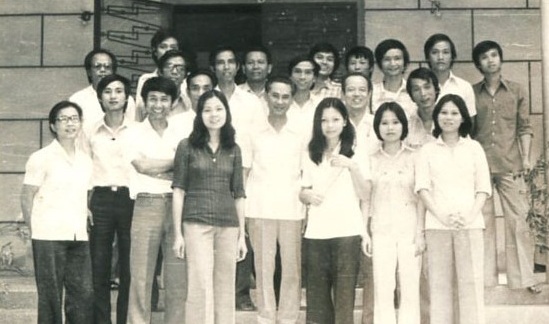
Time flies, it's been 40 years since Cambodia was liberated from the genocidal Pol Pot, Yeng Sari, and Khieu Sampon regimes, and 37 years since we started teaching Vietnamese in Cambodia.
Here are a few memories I've recorded to commemorate my beloved 20s.
CK Staffing
This was a special assignment given by the Ministry of Higher Education and Vocational Training (now the Ministry of Education and Training) to the Vietnamese Language Department of Hanoi University in 1980 to meet the practical needs taking place in the Cambodian battlefield immediately after the Pol Pot genocidal regime was overthrown by the Vietnamese Volunteer Army and the Cambodian National United Front for Salvation's insurgents on January 7, 1979.
The Department of Vietnamese Language, Hanoi University, was tasked with recruiting Vietnamese language graduates from the 1976-1980 cohort to train them in Vietnamese language teaching, English language skills, and preparation for teaching Vietnamese in Cambodia.
The 21st cohort of the University had 18 students recruited into the Faculty (17 into the Faculty of Literature, 1 into the Faculty of History; next year, 5 more will be recruited from the 22nd cohort of the Linguistics major in the Faculty of Literature) and they focused on studying English and practicing teaching Vietnamese in preparation for their departure.
In fact, immediately after the liberation on January 7, 1979, three veteran teachers from the Vietnamese Language Department of Hanoi University were dispatched by their superiors to Thu Duc to provide intensive Vietnamese language training for a number of key cadres of the Cambodian National United Front for Salvation over a period of three months.
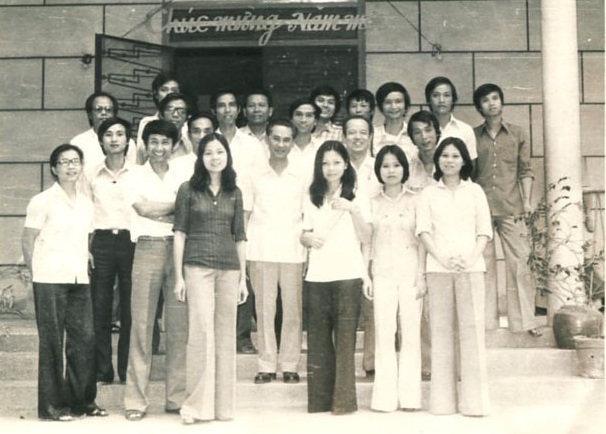
A group of Vietnamese language teachers in Cambodia pose for a photo with the Minister of Higher Education and Vocational Training, Nguyen Dinh Tu, in 1983.
Atmosphere of war
While waiting to depart, we attended a meeting at the Ministry with members of the Vietnamese Language Department who would be going to Cambodia. The meeting, which emphasized the spirit of international duty, was chaired by Mr. Hoang Xuan Tuy, then Deputy Minister of Higher Education and Vocational Training. He spoke about international duty and stressed: “Each comrade has a duty to go for one year; whoever dares to go for three years will be granted an apartment and a salary increase by one level upon their return.” The latter part of that statement proved true, as I ended up staying for over seven years.
After only a few months, the first group had to leave for Cambodia to teach Vietnamese at the Phnom Penh University of Foreign Languages. The group consisted of several veteran teachers and half were "new recruits." After a year, the group was replaced. I and about ten friends joined the second group. That day, around 4 a.m. on June 21, 1982, our group gathered at the beginning of what is now Alley 30 on Ta Quang Buu Street to quietly head to Noi Bai Airport and catch an early flight to Phnom Penh (it was a fascinating coincidence; I recently learned that on June 21, five years earlier, Regiment Commander Hun Sen and his comrades also sought help in Vietnam to fight against Pol Pot). There were also tearful farewells from those who saw us off, mostly our siblings and parents, because except for a few veterans returning to university, we were all only 22 or 23 years old. I remember Thuan, the older sister of Thuan from my group, tearfully giving me instructions:When you get there, remember to look after and protect each other, Nam..
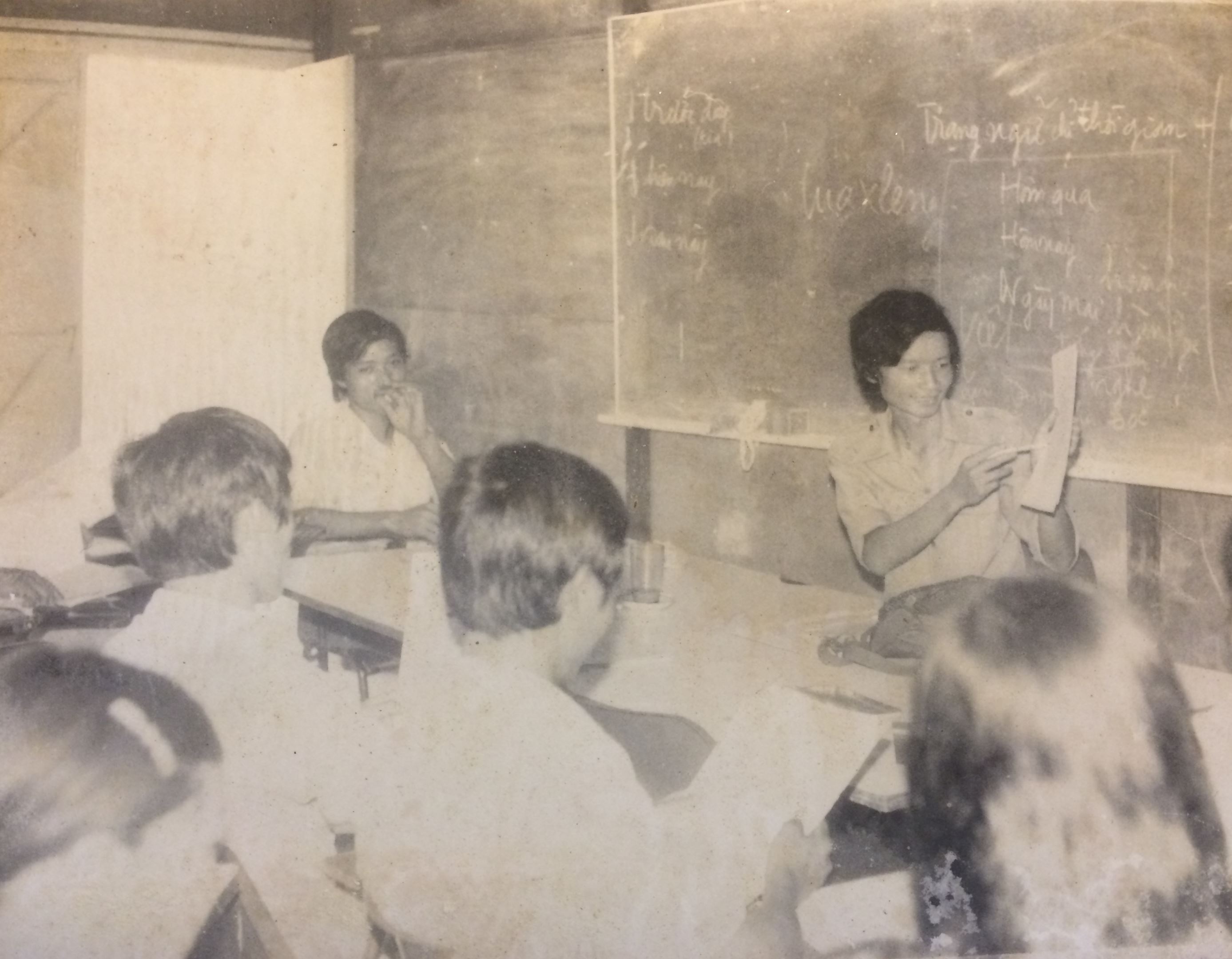
Vietnamese language class in Cambodia in 1983
The plane landed at Pochenton airport at about 10:30. The airport looked almost like a military airfield. There were many people in the uniforms of the Vietnamese and Cambodian Revolutionary Army. Many military helicopters were parked in the distance. What I can't forget is the girl checking luggage; in her right hand she held a pistol, and in her left hand she checked the boarding pass. I thought to myself, no wonder the deputy minister said, "Who would dare go for three years?" The atmosphere was so war-like! I was afraid the gun might accidentally fire. Later, when I got to know that employee, I recounted this story, and she laughed and said that the atmosphere wasn't that war-like, but that she was indeed holding a military passenger's handgun that had been given to the flight attendants.
Regulations of the university expert team
After 3 years, 8 months, and 20 days under the Pol Pot genocidal regime, a depopulated capital with many areas turned into wild forests. We lived in the Vietnamese Experts' Zone in the Bang Kinh Koong market area since the time of Sihanoukville and Lon Nol. Trees had grown like forests in and around the villas.
The University expert delegation stayed in a villa near the Bang King Koong market. On the very first evening, our group held a meeting to hear the head of the University expert delegation, Mr. Phan Hoang Manh, explain the delegation's regulations. Mr. Phan Hoang Manh was the Director of the Secondary Education Department of the Ministry of Higher Education and Vocational Training at the time, sent as a university expert to help our friends build their nascent university system after the genocide. These regulations, drafted by Mr. Manh, contained very strict, detailed, and practical rules about life in the delegation's building. When explaining them, he added specific examples to illustrate them better, making everyone exchange knowing smiles. The first and most emphasized word was "hard work." For example, we are here, far from our homeland, far from our families, so we must build our group into a warm and close-knit family, and we must have a spirit of hard work, we must build a hardworking lifestyle, we must build a life of hard work… Then, our group has two guns and we've temporarily assigned them like this: the pistol is carried by the group leader, and the carbine is held by Comrade Tung, because Comrade Tung is a veteran who has been through battles. Remember to always clean them carefully and, most importantly, don't let them accidentally fire. And there are many details about the men's and women's restrooms, carrying water to fill the buckets in the restrooms, about guests visiting the group…
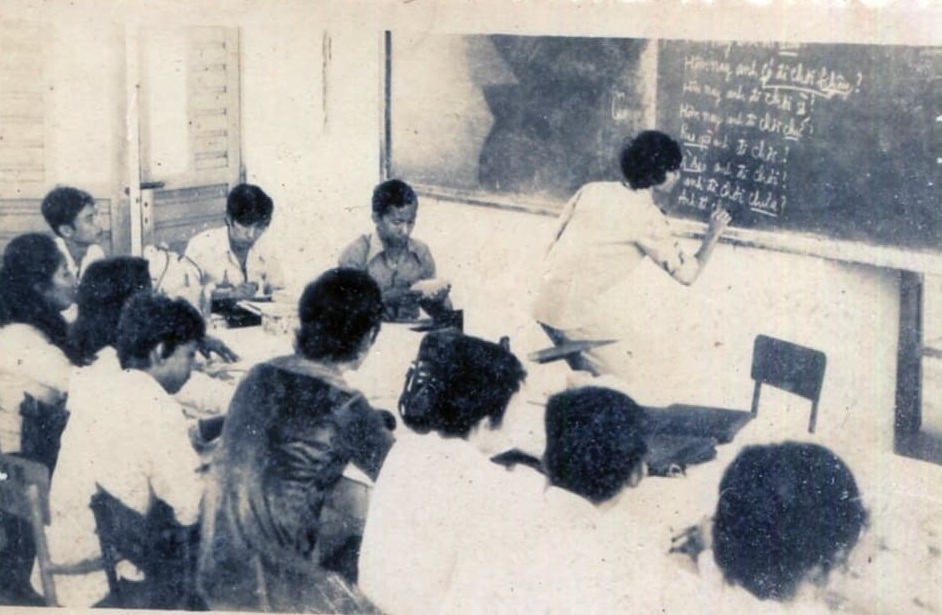
Every few months, a new group of teachers would be added to meet the demand, and each time a new delegation arrived, even if it was only three people, there would immediately be a meeting that evening to brief the newcomers on the rules. We remembered these things by heart. And six months after arriving in Cambodia, we celebrated our first Tet (Lunar New Year) in 1982-1983 far from our homeland. Uncle Manh, the head of the delegation, returned home, and in the lonely late night, the three of us – Vu Thanh Tung, Nguyen Trong Tan (later a writer), and I – composed a song.RegulationsUncle Manh sang it in the style of Nghe Tinh folk songs. I sang it, and Trong Tan recorded it on reel-to-reel tape. I assured him it was very artistic, beautiful, and not at all disrespectful; he should listen to it. And he agreed to let me try singing it. So I grabbed my guitar and strummed it loudly while singing the whole song. Uncle Manh burst out laughing after listening and said:Too much, too much, if you guys spread it like this, it's too much.(Uncle Mạnh is from Hue). Later, Uncle Mạnh contacted me many times asking me to cover that set of regulations for him. I kept promising but never managed to do it because I forgot one line. Then, two years ago, one day when I got home, my wife said, "Uncle Mạnh called again this afternoon and asked me to tell Nam to give him the song."RegulationsAnd coincidentally, I remembered the forgotten phrase, "If anyone doesn't comply carefully, their song must be confiscated and handed over to the head of the delegation." So I sang it again, then asked my wife to record it with her phone and send the link to him via email. When the head of the delegation returned to Cambodia, I intended to show off my "achievement" of setting folk songs to music:Do you like listening to the song about "house rules"?"?" was corrected by the uncle: "What's so great about you guys composing verses to slander me??” (Someone has already informed the boss about this).
The joke goes like this:
Editor's noteRegulations(according to the folk song style)
Original text of the Rules: Phan Hoang Manh
Lyrics by: Vu Thanh Tung, Nguyen Trong Tan, Nguyen Thien Nam
Cover artist: Nguyen Thien Nam
1.
Well, being here far from our homeland and family, we must build our team into a warm and close-knit family.
We must build a life of hard work.
We must build a life of hard work.
If guests come to visit and stay overnight.
We must report to Team Leader Mạnh.
The first thing we must do is take precautions.
2.
Okay, our group has two guns, so let's temporarily assign roles like this...
The pistol was carried by the team leader.
The leader of the delegation was carrying the pistol.
The Carbine rifle was held by Tung.
Always clean carefully.
The first thing is to prevent accidental firing.
3.
Uh, well, there are men and women here, so we have to divide them into two distinct areas.
The bucket must be refilled with water regularly.
You must fill the water bucket regularly.
When you run out of paper, you must get more immediately.
Be careful while you're sitting in there.
It's already unfinished, how am I going to fix it?
4.
Oh, the veranda is the face of the group, so we must uphold a sense of responsibility and protect public property.
Comrade Tuyet is in charge of watering the flowers.
Comrade Tuyet is responsible for watering the flowers.
No one is allowed to hang clothes to dry at the gate.
If anyone does not comply carefully
Then it must be confiscated and handed over to the team leader.
5.
Oh dear, our group also has an extra refrigerator, and since the electricity is so unreliable, everyone needs to be mindful of it.
If you plug it into the refrigerator and don't hear any gurgling sound.
Then we must quickly pull it out, pull it out in time!
6.
Conclude:We must build a life of hard work.
We must build a life of hard work.
We must build a life of hard work.
We must build a life of hard work.
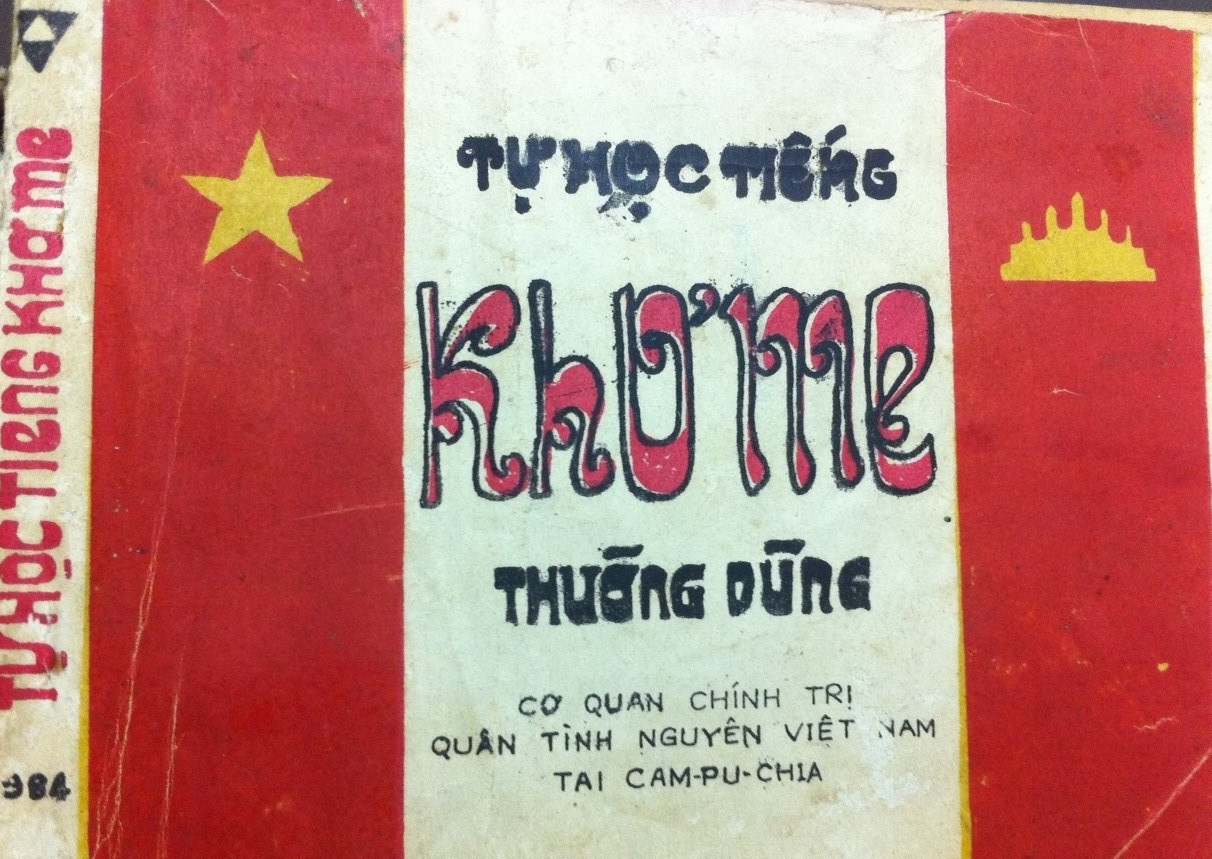
Self-study Khmer language textbooks were compiled during this period.
Reckless
There's something I can only tell you now.
Back in 1982, many in our group believed that the building we were staying in was haunted. Many people heard strange noises at night. Young female teachers often experienced sleep paralysis. In my room, around 2 a.m., there were strange noises, like knocking on the wall. One night, I and a man named Nguyen Van Phuc, who shared the room, both woke up because we heard strange noises. We got up, turned on the lights, and checked, but saw nothing. We turned off the lights and lay back down, occasionally hearing the noises again.
Nguyen Trong Tan, a former soldier who studied at university in the same year as me, attended the same Vietnamese Language Department, and went to Cambodia at the same time, had a special talent for covering his mouth with his hand and imitating the sound of a crying baby. One evening, he, I, and Vu Thanh Tung decided to prank Dang Van Dam, the team leader who had confidently declared there was a ghost in his house. That night, late at night, the three of us went to Dam's room and pretended to hear a baby crying through the window shutters. Then we ran back to our room. Dam came out but saw nothing. We pranked him like that about twice, until the intelligence officers from Department 2 in the villa next door heard us and searched the overgrown garden behind the house with flashlights for several hours. Finally, one of them angrily shouted: "If any of you are pregnant, tell us so we can take you to the hospital!" That same night, a crucial part of the intelligence team had to move immediately. Tan told us to keep this a secret, because if it got out, we would face severe disciplinary action.
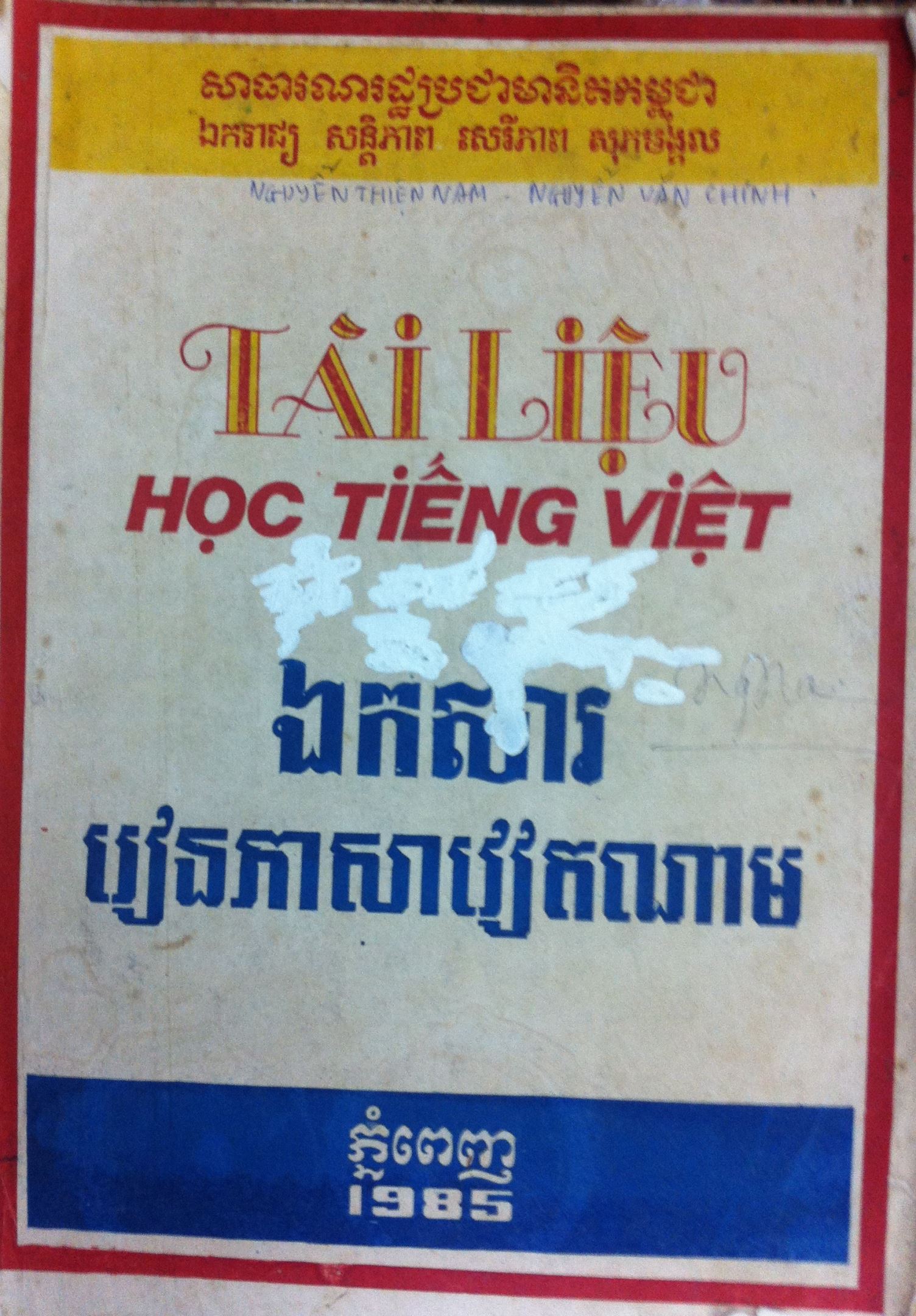
Vietnamese language learning materials compiled for use in Cambodia.
Gathering firewood and getting drunk.
In 1983, due to the increasing number of members in the delegation, the accommodation near the Bang King Koong market became overcrowded, so the university expert delegation was moved to the 284th Medical Station of the Vietnamese Expert Delegation, after the station relocated to a new location within the A40 expert zone. At this time, we no longer ate at the A40 communal kitchen but organized our own meals for the entire delegation of about 20 people. The A40 kitchen was far away and didn't provide enough food. On Saturdays, the male teachers would often pull their tricycles into the Bang King Koong market area, which was then like a dense forest, to collect firewood. Once, we left at 9 a.m. and while cutting dry branches from the bushes, we discovered three bald-headed intelligence soldiers butchering a dog. Upon questioning them, we learned that these young soldiers were learning Khmer, and the reason for shaving their heads was to focus on their studies and avoid wandering around outside. After getting acquainted, the three guys invited us to stay and drink with them. Finding it interesting, about five or six of us agreed. After filling our carts with firewood, we went into the house of this intelligence group. There were about ten of us, including a platoon leader, handsome like a movie star. He asked everyone's permission to drink from a teapot and bowls, meaning one teapot of wine and one bowl, sitting in a circle and taking turns, each person having to drink it all. After a few rounds, Dao Van Hung suddenly collapsed and lost consciousness. Everyone carried him to bed and continued drinking. After we were all drunk, music was turned on and all the men started dancing. While dancing, Dao Hung woke up and joined in. Around one o'clock in the afternoon, the whole group staggered back home, and at the same time, they met Uncle Manh, the group leader, and the young female teachers who were looking for him because they had been waiting for lunch and were worried something had happened.
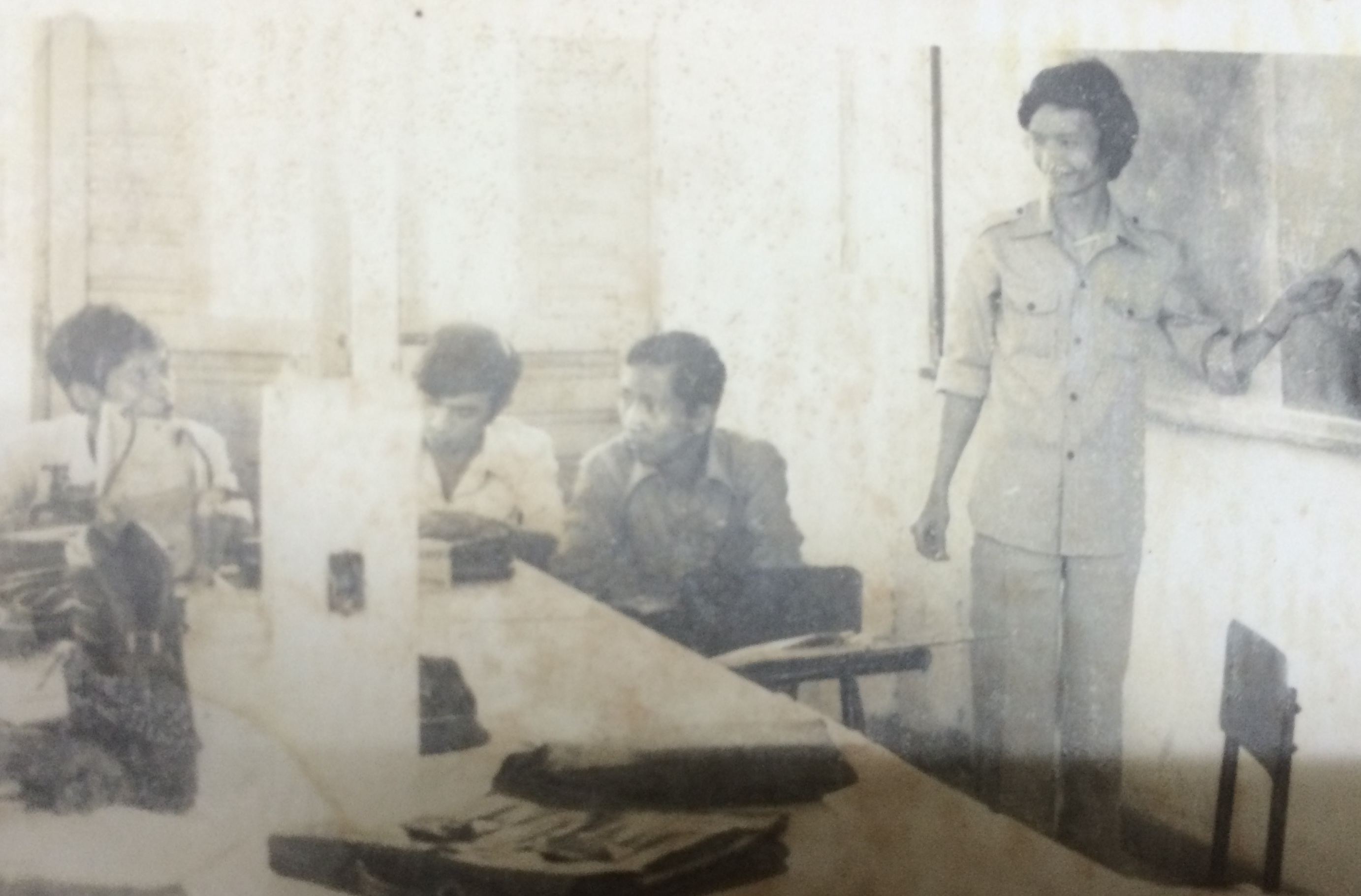
Teaching thousands of people all by himself, and living alone in two mansions.
In 1984, I was seconded to teach alongside Mr. Nguyen Van Chinh at the Phnom Penh University of Medicine and Dentistry. With only two teachers, we taught two classes of international students specializing in Vietnamese, preparing them to study medicine and dentistry in Vietnam. In addition, all students from the first to third year of the university, including both undergraduate and vocational students, received 4 to 6 Vietnamese language lessons per week. Thus, the total number of students studying Vietnamese was several thousand. We combined the two classes of international students into one and divided the teaching responsibilities among the non-specialized students, teaching both morning and afternoon. We worked tirelessly; some classes had 400 students. The teachers taught using microphones, while the students learned from a bilingual summary we compiled. The bilingual vocabulary and simple instructions and explanations were translated into Khmer by a Cambodian teacher at the university who knew Vietnamese. The key to students' knowledge acquisition was this bilingual textbook with easy-to-understand explanations and the semester exam. Once there was an exam, students had to study carefully. The school required and supported us in organizing the exams very strictly. On the exam day, we invited 15 Vietnamese language teachers from several universities (including the University of Economics, the University of Transport, and the University of Politics) to conduct the oral exams on our behalf. During the written exams, dozens of school staff members assisted in supervising to prevent cheating. In 1989-1990, I was the only one teaching Vietnamese at the Phnom Penh University of Medicine and Pharmacy, although the number of students studying Vietnamese was still over a thousand. During this time, I completed the book "Vietnamese for Cambodians"Three volumes, carefully bilingual. The teacher could give us assignments for self-study at our leisure. For the exams, I still relied on a group of about 15 Vietnamese language teachers from the University and the University of Economics to help me with the oral exams. During this time, I no longer stayed at the Ministry of Health Hotel; my friend moved me to an old villa at the end of Monivong Street, near the Pa De Voat Hospital (the Revolutionary Hospital), which has now reverted to its old name, Calmet Hospital. This villa actually had two rather large buildings. I stayed in the nicer one, with two floors and six rooms. These two buildings were situated in a large garden with many mango, coconut, custard apple, and lemon trees… and several frangipani trees, like a quiet temple. I don't understand how I managed to live alone in that building for a whole year. Late at night, the wind from the Mekong River rustled through the coconut trees in the garden, and occasionally old coconuts would fall with a thud, covering the base of the trees. One night, around midnight, while I was sleeping, I heard a loud noise, and I..." Startled, he quietly sat up, his heart pounding, with the pistol he'd borrowed from the group propped under his pillow. It turned out to be the sound of a window in another room being slammed shut by the wind.
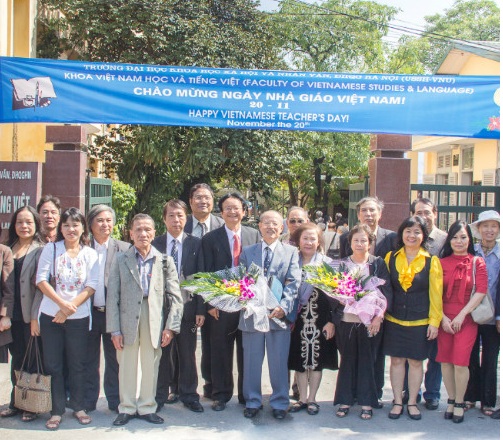
Many lecturers of the Department of Vietnamese Studies and Vietnamese Language have spent many years fulfilling the task assigned by the Vietnamese Party and Government of teaching Vietnamese in Cambodia.
Once, a delegation of professors from the Vietnamese Ministry of Health came to lecture at the Medical School. They included Professor Do Trong Hieu, Professor Hoang Ba Long, Professor Nguyen Van Thanh, and Professor Duong Cham Uyen. I invited the professors to visit my "monastery," my "temple." The professors were astonished to learn that I had been living here for a long time, alone in a deserted garden, going to the market myself, cooking my own meals, eating alone, teaching Vietnamese to thousands of students, and spending my days engrossed in my studies or those messy, illegible handwriting books. Afterwards, whenever I returned to Hanoi, I would contact them, and the four professors would invite me for drinks at one of their houses.
Occasionally, groups of students would come to visit, and they would ask, "Aren't you lonely living like this, teacher? Aren't you afraid of 'Pol Pot'?" (Pol Pot = the Pol Pot regime). I replied, "I can accomplish many things on my own, and whether I live or die is already predetermined."
I wasn't scared back then, but thinking about it now, I'm quite frightened!
As for the CK staff, those who were on the CK staff later on, and up to the present day, have been called by many the "golden generation" in the profession of teaching Vietnamese to foreigners.
Hanoi, January 2019
Author:Assoc. Prof. Dr. Nguyen Thien Nam (Head of the Department of Vietnamese Studies and Vietnamese Language)
Newer news
Older news